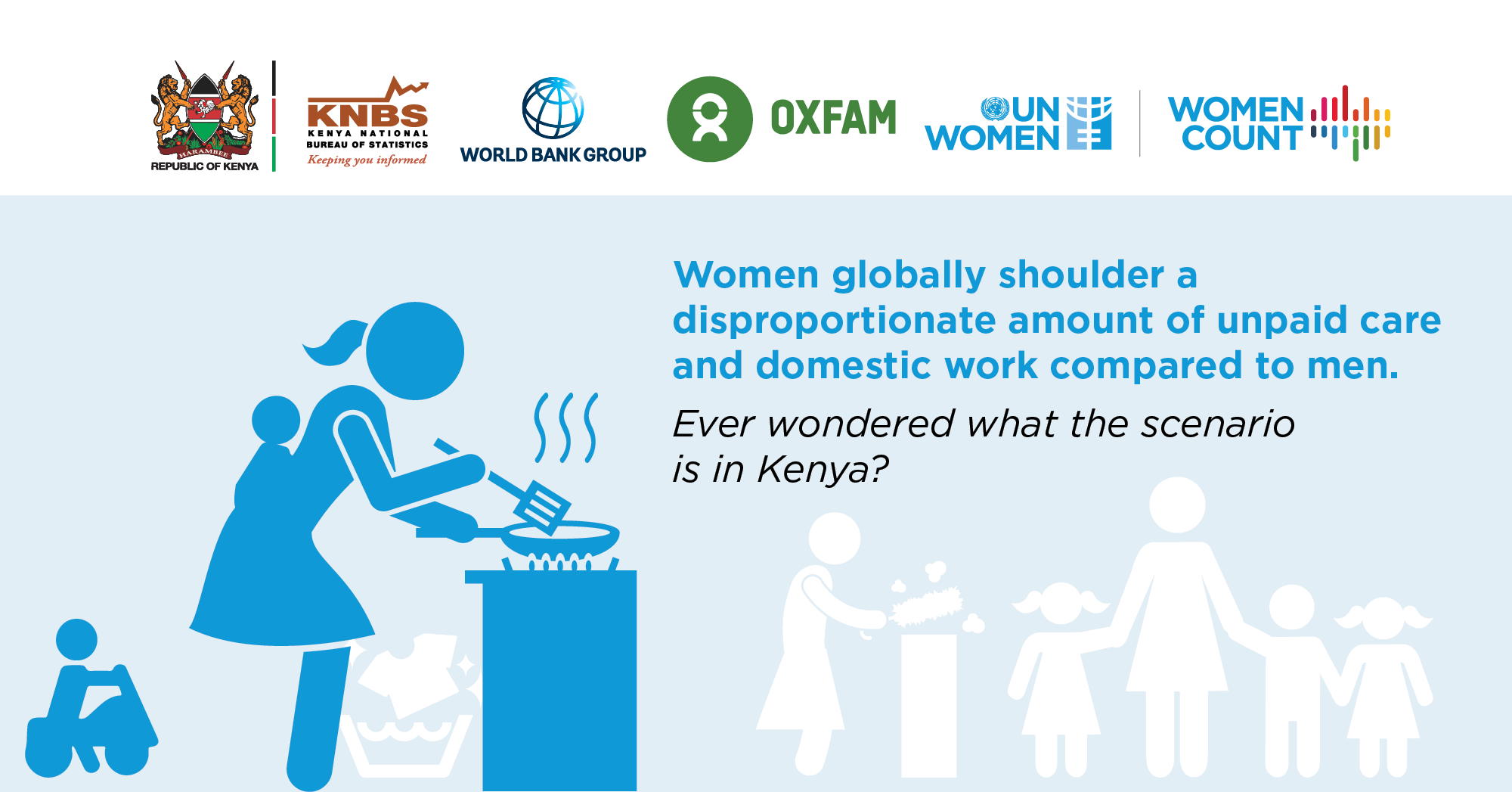Women’s Contribution to Kenya’s Socio-Economic Achievements Under-Reported
Date:

Nairobi, 18 October 2023 − The release of Kenya’s first-ever Time Use Survey Report is set to jumpstart the inclusion of data on unpaid household and care work in the economy through a gendered lens. The report finds that nationally, women spend approximately five times as much time as men on unpaid domestic and care work, a situation which can perpetuate gender inequalities and hinder women’s empowerment. Yet, this contribution is not properly accounted for in the national economy.
A joint initiative of the Kenya National Bureau of Statistics (KNBS) in partnership with the State Department for Gender and Affirmative Action (SDfGAA), UN Women, the World Bank, and Oxfam International, the Kenya Time Use Survey Report is based on the 2021 Kenya Continuous Household Survey, which included a standalone survey on time use. The National Gender and Equality Commission (NGEC), the Council of Governors (CoG), and the University of Nairobi (UoN) were instrumental partners in the time use survey and emerging report.
“The disproportionate burden of unpaid care and domestic work on women can significantly limit their ability to engage in productive activities or participate in public life and even contribute to the feminization of poverty,” said Anna Mutavati, UN Women Country Representative and Acting Deputy Regional Director for East and Southern Africa.
“The new data is important for accurately measuring the household production of goods and services and their contribution to the national economy,” said Sebastian Tiah, Country Director, Oxfam in Kenya.
“Without time use data, gross domestic product, the current measure of economic activity, is in essence incomplete as it excludes the unpaid production of household goods and services, which is mainly done by women,” said Keith Hansen, World Bank Country Director.
“This results in under-reporting women’s contribution to the country’s socioeconomic growth,” said Hansen.
On average, women and girls in Kenya over the age of fifteen years spend three hours every day on unpaid domestic and care work. Nationally, women spend approximately five hours on unpaid domestic and care work per day compared to men who spend about one hour daily on this work.
This pattern of time spent on this work by area of residence is similar although women in rural areas spend slightly more time on unpaid domestic work alone compared to their urban counterparts.
By region, the survey found that women in Marsabit County spend the highest proportion of time (7 hours) every day, nearly double the national average, on unpaid domestic and care work. However, men in Marsabit County spend the national average time of one hour per day on unpaid care and domestic work.
Women in Wajir, Samburu, Mandera, and Garissa counties also spend a notably high proportion of their time on unpaid care and domestic work, significantly above the national average while women in Kilifi, Uasin Gishu, and Kitui counties spend the lowest proportion of their time on this work. Men in Turkana County spend nearly five hours per day on unpaid domestic services for household and family members−the highest amount of time for men nationally and a sharp contrast with Isiolo County, where the study indicates that men spend just over 1.5 hours on unpaid care and domestic work, the least amount of time spent by men nationally.
Findings from the Kenya Time Use Survey Report resonate with statistics from the International Labour Organization (ILO), which indicate that three-quarters of all unpaid care work globally is undertaken by women and girls.
Recognizing and addressing the disproportionate burden of unpaid work on women and girls is crucial for gender equality and women and girls’ empowerment and for women and girls to fully participate in economic and social development for national growth.
“Beyond regular and periodic national surveys to provide much-needed time use data, the report also calls for the development of an unpaid care and domestic work policy to provide a legal framework to recognize, reduce, and redistribute unpaid care work,”said Macdonald Obudho, Director General, KNBS.
“The development of labour policies to support the integration and transition of unpaid caregivers into the labour force is also needed. This would also help to establish family-friendly working arrangements for all workers, regulate and implement decent terms and conditions of employment, and help achieve equal pay for work of equal value for all care workers.
“This data will help to recognize and even value unpaid care and domestic work in economic terms,” said State Department for Economic Planning Principal Secretary James Muhati.
“Providing public services, infrastructure, and social protection and promoting shared household responsibility in the local context will go a long way in empowering women and girls for the benefit of all,” said Anne Wang’ombe, Principal Secretary, State Department for Gender and Affirmative Action.
These and other interventions will help free up women to engage more in paid productive activities and subsequently assist in poverty reduction and boosting Kenya’s socio-economic growth.
ENDS
For media enquiries, please contact: Medina Ibrahim, Manager Corporate Communications E: [ Click to reveal ] Sylvia Maina E: [ Click to reveal ] Maureen Otieno E: [ Click to reveal ] and Joseph Odongo, Media and Communications Advisor E: [ Click to reveal ]